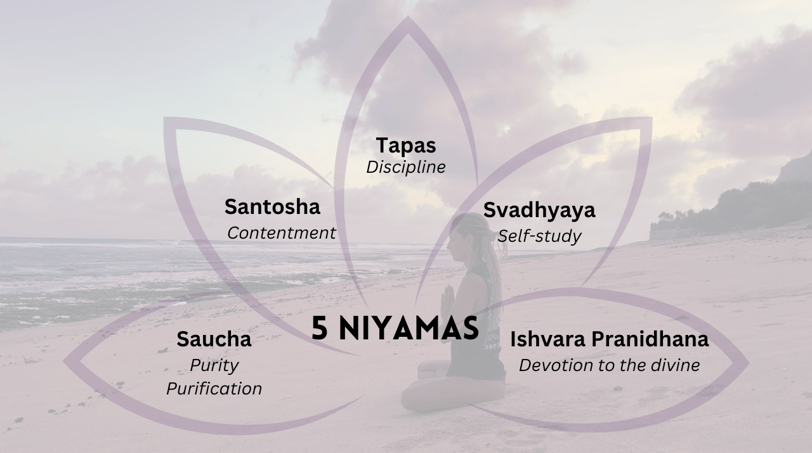The 5 niyamas: the to-do's of life - or: “Be your own guru! Create habits and routines that work for you.”
Yoga philosophy
1/1/20254 min read


1. Saucha (purity): Purity and clarity for body, mind and soul
In yoga, this term means purity and order, not only on the outside but also on the inside. It is about consciously creating space for clarity, be it in your home, your body or your thoughts. Taking a regular shower and brushing your teeth every day is a good start. But there's more. What and how much food do you give your body? Is your environment clean and tidy? Do you practice mental hygiene? What information do you feed your mind every day and what is the quality of your thoughts? Are they beneficial or stressful? You can apply Saucha to all areas of your life. Create order and clarity one step at a time. Because you know the saying: "As within, so without”
2. Santosha (contentment): Gratitude is the key to contentment in the here and now!
Santosha, the yogic principle of contentment, teaches us that true happiness is not to be found on the outside, but deep within ourselves. It's not about always being happy or perfect, but about making peace with the present moment - no matter how imperfect it may seem. Instead of constantly striving for more, Santosha invites us to pause and consciously perceive the fullness of the here and now. Contentment does not mean stagnation. Rather, it gives us the freedom to act without the pressure of excessive expectations. Santosha manifests itself in everyday life when we learn to enjoy the moment instead of constantly evaluating or changing it. There are so many things we can be grateful for every day: a roof over our heads, food, clothing, family, friends and the small pleasures that surround us. If you practice gratitude every day and find peace with yourself, you will feel more joy in life and gain new energy. Your thinking will change from a feeling of lack to an awareness of abundance. Take the test: take a day to consciously be grateful and cultivate contentment. Observe how your view of yourself and the world around you changes. Santosha opens the door to a life full of lightness and inner peace.
3. Tapas (discipline): Keep your inner fire burning: Develop willpower - patience & perseverance
Whether it's getting up in the morning or your daily yoga practice, you need to have a bit of willpower and discipline, and every time you get on your mat, you train it. Yes, you can train willpower like a muscle. Perhaps the word discipline is also associated with negative thoughts and feelings for you, but it's more about recognizing that you are capable of surpassing yourself through consistency, regular sacrifice and repetition. That you step out of your comfort zone and expand your boundaries. In the long term, you will develop more and more self-confidence, inner strength and self-awareness. In the meantime, I no longer allow my mind to argue: Am I going to go on the mat or not? I stop this thought immediately, roll out my mat and surrender to my practice. It's about activating and strengthening your inner fire (agni) and allowing this energy to flow into your daily life. Just do it!
4. Svadhyaya (self-knowledge/self-study): Svadhyaya - The art of meeting oneself!
Svadhyaya literally means “self-study” or “the study of the sacred scriptures”. In traditional yoga practice, it invites you to explore both the teachings of spiritual texts and your own inner self. It is not just about understanding philosophy, but about getting to know yourself on a deeper level. It is about regularly pausing and mindfully observing our own thoughts, feelings and behaviors. It is a tool for self-reflection that helps us to discover our true selves behind the roles and masks of everyday life. This can be done through meditation, journaling, mindful breathing or reading inspiring texts. Svadhyaya promotes awareness of our strengths, patterns and challenges. With this clarity, we can let go of old habits that no longer serve us. You gain more and more self-knowledge, which in turn helps you to get to know your own nature better, to meet ourselves with more acceptance and compassion. This promotes inner balance and peace. The yogic scriptures as well as other philosophical or spiritual texts remind us that we are part of a greater whole and support us on the path to a deeper understanding of our BEING and the divine.
5. Ishvara Pranidhana (devotion): The ways of the Lord are unfathomable, but everything makes sense in the end!
Trust that the universe has a plan - even if this plan does not reveal itself immediately. Surrendering completely to a thing, a moment or even a feeling means letting go of the need for control and giving life space to unfold freely. This surrender asks us to go beyond our ego and transcend our personality boundaries. Is that easy? No, it requires courage and trust, especially when we feel like we are drowning in the chaos of life. But it is in these moments that transformation occurs. When you leap into the unknown and trust that everything has a purpose, you begin to experience the dance with life anew. Even when your world seems to be falling apart, this is often the seed for something new. The art of letting go gives you the freedom to surrender to the flow of life. So take a deep breath, let go - and let yourself be carried.
Now comes the part where the focus is more on your behavior towards yourself and the effects it has on you and your life.
Soul Solutions
Holistic yoga coaching for your physical, mental and spiritual well-being.
E-Mail: kontakt@soulsolutionsyoga.com
Created with Love © 2024.All rights reserved Impressum / private policy
